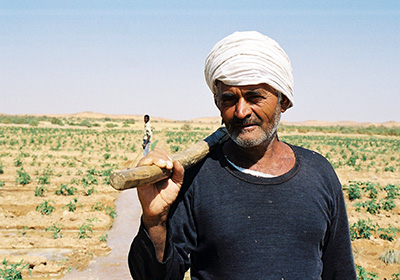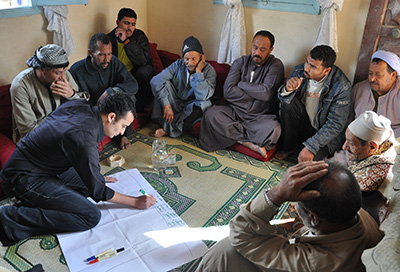Our Expertise

- Health Management
- Healthcare Service Delivery
- Preventive Medicine
- Reproductive Health and Sexuality
- HIV/AIDS
The basic philosophy that guides the health program is that multiple social, economic, cultural, and psychological factors lie behind the health-related phenomena, and cannot, therefore, be resolved by medical science alone. The research activities within the health program essentially look into the roles social factors play in determining health and illness, status and career of health care professionals, knowledge and attitude of various population groups toward health-related issues, disparities in health service delivery, and people-health care institutions relationships and roles. CDS had multiple self-initiated research projects in the health field, including the winner of the AGFUND prize for most pioneer projects: “Building Nurses Career in Upper Egypt”, conducted from 2002-2006. And parallel to these, we undertook tens of other projects to assist other organizations plan and carry out health-oriented programs permeated by the health-social science intersection. Over the past years, CDS health program has planned and undertaken in collaboration with a large number of government institutions, universities, CSOs, community groups, and international organizations. The program has been carried out in close relation with diverse urban, peri-urban, and rural communities in various settings. CDS incorporates research activities in all health projects in order to bridge gaps in knowledge and create foundations for the application of such knowledge. This usually takes place in the form of capacity building of healthcare organizations, service providers, and CSOs particularly in relation with planning in the health field, health communication, family planning and reproductive health, nursing, and of service quality improvements. The program’s approach is thus inter- and multi-disciplinary seeking. CDS has created manifold opportunities for innovative work to explore phenomena in relation with diverse population groups and topics. Examples include adolescents and sexuality in family and community settings, children living without homes and health averse behaviors, nurses and social stigma, people living with HIV/AIDS and societal discrimination, people’s attitudes impact on morbidity/mortality of avian flu, the disabled and community integration of care, senior citizens and access to special care services, foster children and culture in foster care houses, religious leaders and health communication, gender relations and reproductive health, gender and medical ethics, qualitative experiences of people in healthcare facilities, and the child-to-child approach in health communication.

- Natural resources management
- Agribusiness
- Agro-Ecology
- Eco-Health
- NRM and climate change adaptation
- Water Resources Management
- Urban and rural Water Supply and Sanitation
CDS work in Agriculture is usually associated with how the specific communities can improve their livelihood and economic conditions through using environmental challenges as pillars for positive and sustainable change. The attention we give to the role of women in this particular areas is driven from our years of field research that proven many times that women play a vital role in agriculture and how it affects climatic conditions and water usage.
From improving government extension services to farmers in the 1990s to the applications of eco-health in early 2000, and research and development of adaptive strategies to ‘climate change’ and ‘sea-level rise’ in the coastal zones, CDS’ work in the agriculture and environment sectors over the past years has resonated the major interests and concerns in that area.
Diverse as they are, the experiences that CDS has accumulated over years have built its capacity of work on various levels in the agricultural/environmental realms: direct work with farmers to improve knowledge/skills and learn balancing traditions with modern practices in their agricultural vocation; providing specialized technical assistance and support to governmental and non-governmental institutions; supporting policy makers and international organizations in assessing environmental changes and mitigate their impact on agriculture. The essence of our work in the field of agriculture draws on the basic organizational philosophy of CDS: people’s participation is instrumental for learning and change. To develop effective and sustainable development programs, CDS relies primarily on involving all stakeholders in the assessment of needs, analysis of problems, building and sharing knowledge, and crafting solutions. We are also keen on involving decision makers at local and national levels in our work, advocating for policy change, and bridging the power gap between farmers and marginalized groups so that their voices are better heard by those in power and authority.

- Gender Equality
- Economic empowerment
- Child Care and Development
- Youth Empowerment
- Support to vulnerable groups (incl. youth and migrants)
Our experience in the Gender and Social Rights cover many target groups and sectors. We primarily aim to support individuals and communities to become empowered socially, economically, politically and culturally. Gender is always a cross-cutting theme. Like any other aspect of life, gender relations in a particular society or community are shaped by the economic, social and cultural context (including the powerful forces of religion and traditions), in which people are raised and live. CDS recognizes that gender equality is not only a fundamental and universal human right, but a necessary foundation for a peaceful, prosperous and sustainable world and a sustainable Egypt. The new media, for better or worse, expose young people to a ‘new brave world’ of ideas and information beyond their immediate communities. In this context, CDS recognizes gender inequality as a significant constraint on development and provides support to organizations to ensure gender is integrated into all phases of their programs and/or projects and enables women and men to participate and benefit equally from development initiatives. CDS has worked with women from over 25 governorates and has supported women in building their capacities, enabling them to become leaders within their communities. Our economic empowerment programs mainly target youth and young women to address unemployment and enhance livelihoods. We follow a binary approach to reducing unemployment through employability interventions and developing entrepreneurship skills among youth and young women. Our work with vulnerable groups such as migrants and refugees focuses on enhancing their livelihoods and facilitating their integration in the local communities where they live to enable them adjust to their new lives. Activities we conduct in this field include capacity building, life skills camps, psychosocial support and other activities. Our Child Care and Development contribute to supporting families and their children to access their basic rights, support them to continue their education and provide them with quality lifestyles.

CDS seeks to assist companies in planning and undertaking their CSR initiatives as well as bring new companies to adopt CSR as a policy and practice. The program, in particular, challenges businesses to mobilize their technical and financial resources, improve their CSR performance and have positive impact in the communities where they operate. It customarily works through partnerships it develops with the public, private and civil society organizations in planning and undertaking innovative development initiatives. Through consulting, we help companies formulate their CSR strategy, support them to implement cost-effective and sustainable development projects that meet the community’s needs, engage employees in CSR activities, and develop CSR reports. Promoting CSR as a concept and practice within the local business community has been one of our early objectives, through highlighting the business case of CSR for private enterprises, conducting research related to CSR concept and practice, and publishing CSR best practices. Over the past few years, we have been collaborating with a large number of companies including Barclays Bank, Levis, General Motors, Microsoft, P&G, Raya Holding, Vodafone, and Unilever, among others.

CDS views urban and rural communities as made up of people who have common values and goals and who are capable of enlisting and directing the support needed to achieve their objectives. A complex and extended system of social relationships forms the basis of this network of mutual support and shared responsibility. This then is translated into the social capital needed to realize community potential. Necessary to the overall process of community revitalization, CDS has done significant work to assist local institutions, local government, NGOs, cooperatives and enterprises to develop their own capabilities to expand participation, identify problems and needs, explore alternatives, develop appropriate solutions and mobilize financial and other resources for much needed local community programs and activities.
Based on such views, CDS believes interventions must seek to enhance existing assets which helps realize the aspirations of those most directly concerned. Sound rehabilitation programs must be firmly rooted in a more comprehensive process of community-building where local interest groups, public and private institutions work together to ensure a better future for targeted communities. Through an integrated approach to urban development, we believe that we could build more stable and healthier communities where people can achieve economic self-sufficiency and take responsibility for their future and that of their families.

The focus of CDS’ work in the realm of governance has been on enhancing citizens’ participation in the planning and management of development work, and sensitizing the government officials, CSOs, and academia to be responsive to such participation. We believe that ‘good governance’ is dependent on ‘people’s participation’ and that peoples’ competencies, knowledge and personality attributes are indispensable to participatory processes. ‘Capacity building’ of organizations and individuals in the government sector, civil society, and at community-level has dominated much of CDS’ work since its inception, aiming to enhance people’s capabilities and access to knowledge and resources, as well as facilitate processes for their free association. In its governance-related work, CDS emphasizes the inclusion of the disadvantaged groups that are more prone than others to exclusion and discrimination, namely women, the poor, youth, and children. Specifically, CDS has been working during the past few years with Egyptian youth from 25 governorates, developing their skills and helping them network with governmental institutions and NGOs. Giving them a platform to develop themselves and their ideas to be better and active citizens within their communities.
